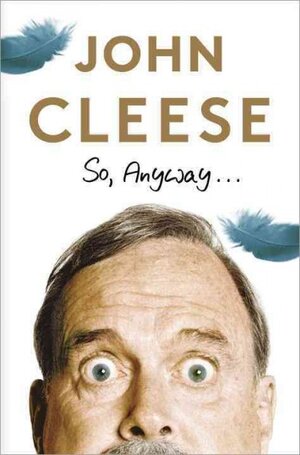
National Public Radio (NPR) has an interview with John Cleese about his new autobiography
So, Anyway... Check it out to discover what the British wit whose comic characters and hit movies, including
Monty Python and the Holy Grail, Time Bandits, and
A Fish Called Wanda, has to say about writing funny.
Here's a highlight from the NPR interview:
Cleese's advice for young comedy writers"I tell them to steal, because comedy is extraordinarily difficult. It's much, much harder than drama. You only have to think of the number of great dramatic films and then compare that with the number of great comic films ... and realize that there's very, very few great comedies and there are lots and lots of very great tragedies, or dramas. That tells you, really, which is the hard one to do. So at the very beginning, to try to master the whole thing is too difficult, so pinch other people's ideas and then try to write them yourself, and that'll get you started."
To read and listen to the NPR interview, click on this link to NPR's
website:Do you agree that it's hard to write funny?
Hope you enjoyed this post! To be notified of future updates, use the subscription options on the right side bar.
Jessica Prentice coined the word “locavore” which was chosen as the Oxford Word of the Year! We asked her how the word came about. Her answer is below.
There’s only one word for it: giddy. That’s how I’ve been feeling since reading the first email informing me that “locavore” was voted 2007’s “Word of the Year” by Oxford University Press. It’s the same feeling you have when you’re twelve years old and the guy you have a crush on gives you a valentine, and doesn’t give one to anyone else. You blush, you jump up and down in your seat, and you send excited text messages to the people you know will understand.
And how exciting to be asked to blog about it and be able to tell the story from my point of view! From the very beginning, the word “locavore” had legs. It’s actually been a fascinating phenomenon to watch: to see something that never existed before take on meaning and gather momentum. It’s also a phenomenon that would have been impossible before the internet. So, how did the word “locavore” come about? (more…)
Share This
 It’s always an exciting time at OUP when the New Oxford American Dictionary’s Word of the Year is selected. As announced here on Monday, this year’s choice is locavore, meaning “a person who endeavors to eat only locally produced foods.” The word may very well strike a resonant chord for anyone who has mulled over how many miles a bunch of bananas has logged before it gets to the local grocery store. But unlike some of our previous Words of the Year — most recently, podcast in 2005 and carbon neutral in 2006 — locavore is very much “on the cusp,” not yet firmly established in widespread usage, despite its great potential. That means Oxford lexicographers will continue to monitor its progress to see if it eventually warrants inclusion in the next edition of NOAD.
It’s always an exciting time at OUP when the New Oxford American Dictionary’s Word of the Year is selected. As announced here on Monday, this year’s choice is locavore, meaning “a person who endeavors to eat only locally produced foods.” The word may very well strike a resonant chord for anyone who has mulled over how many miles a bunch of bananas has logged before it gets to the local grocery store. But unlike some of our previous Words of the Year — most recently, podcast in 2005 and carbon neutral in 2006 — locavore is very much “on the cusp,” not yet firmly established in widespread usage, despite its great potential. That means Oxford lexicographers will continue to monitor its progress to see if it eventually warrants inclusion in the next edition of NOAD.
(more…)
Share This




